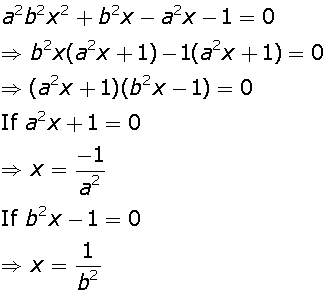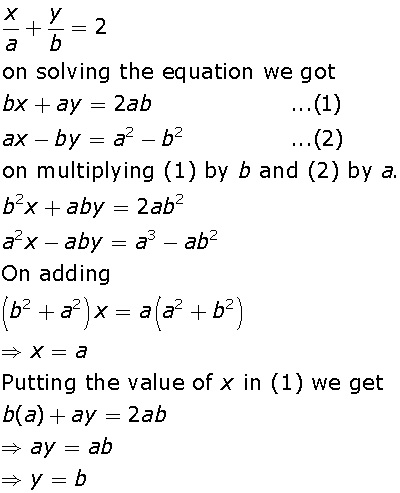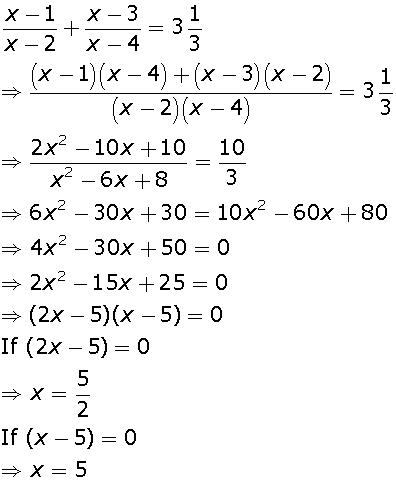CBSE [ All India]_X_Mathematics_2005_Set I
To Access the full content, Please Purchase
-
Q1
Solve for x:
 Marks:3View Answer
Marks:3View AnswerAnswer:

-
Q2
The cash price of a machine is Rs 9,000. It is also available at Rs. 2,200 cash down payment followed by five equal monthly installments of Rs 1,400 each. Find the rate of interest under the installment plan.
Marks:3View AnswerAnswer:
Out of syllabus -
Q3
Add the difference of

Marks:3View AnswerAnswer:
Out of syllabus -
Q4
Find the sum of all two digit odd positive numbers
. Marks:3View AnswerAnswer:
Two digit odd positive numbers are
11, 13, 15, 17, ..., 99
a = 11, d = 13 - 11 = 2
l = 99
a + (n - 1)d = 99
11 + (n - 1)
 2 = 99
2 = 99(n - 1)
 2 = 88
2 = 88n - 1 = 44
n = 45
Sn = (n/2)(2a + (n - 1)
 d)
d)= (45/2)(22 + 44
 2)
2)= (45/2)(2
 55)
55)= 45
 55 = 2475
55 = 2475 -
Q5
Solve for x and y:

Marks:3View AnswerAnswer:

-
Q6
A two digit number is four times the sum of its digits and twice the product of the digits. Find the number.
Marks:3View AnswerAnswer:
Let the unit place digit be x and tens place digit be y
Sum of the digits = x + y
Number = x + 10y
According to the question
x + 10y = 4(x + y) -----(1)
and
x + 10y = 2xy -----(2)
On solving equation (1)
x + 10y = 4(x + y)
 3x = 6y
3x = 6y x = 2y
x = 2yPutting the value of x in equation (2)
x + 10y = 2xy
 2y + 10y = 4y2
2y + 10y = 4y2 12y = 4y2
12y = 4y2 y = 3
y = 3 x = 2y = 6
x = 2y = 6 Number = x + 10y = 6 + 30 = 36
Number = x + 10y = 6 + 30 = 36 -
Q7
Find a and b so that the polynomials: P(x) = (x² + 3x + 2)(x² + 2x + a) and
Q(x) = (x² + 7x + 12)(x² + 7x + b)Marks:3View AnswerAnswer:
O ut of syllabus. -
Q8
Solve for x:

Marks:3View AnswerAnswer:

-
Q9
The 8th term of an Arithmetic progression is zero. Prove that its 38th term is triple its 18th term.
Marks:3View AnswerAnswer:
Let the first term of an A.P be a and the common difference be d
8th term of A.P. = a + 7d
According to the question
a + 7d = 0
 a = -7d
a = -7d18th term of A.P. = a + 17d = -7d + 17d = 10d
38th term of A.P. = a + 37d = -7d + 37d = 30d
3 x 18th term = 38 term
Proved
-
Q10
Deepak borrowed a sum of money and returned it in three equal quarterly instalments of Rs 1,40,608. If the rate of interest charged is 16% per annum compounded quarterly, find the sum borrowed. Also find the total interest charged.
Marks:3View AnswerAnswer:
Out of syllabus



